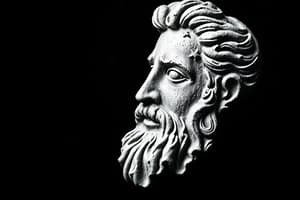Podcast
Questions and Answers
What is epistemology concerned with?
What is epistemology concerned with?
- The history of philosophy
- The art of debate
- The study of human behavior
- The nature and scope of knowledge (correct)
Who were the first philosophers in the Western tradition?
Who were the first philosophers in the Western tradition?
- The skeptics
- The Sophists
- Heraclitus and Parmenides
- The pre-Socratic philosophers (correct)
What did Heraclitus emphasize for knowledge of reality?
What did Heraclitus emphasize for knowledge of reality?
- Role of authority
- Use of intuition
- Use of the senses (correct)
- Role of emotion
What did Parmenides stress for knowledge of reality?
What did Parmenides stress for knowledge of reality?
Who was chiefly responsible for the emergence of doubts regarding knowledge of reality in the fifth century BCE?
Who was chiefly responsible for the emergence of doubts regarding knowledge of reality in the fifth century BCE?
What came under critical examination for the first time during the fifth century BCE?
What came under critical examination for the first time during the fifth century BCE?
Who can be said to be the real originator of epistemology?
Who can be said to be the real originator of epistemology?
What did Gorgias claim about reality?
What did Gorgias claim about reality?
According to Protagoras, what is the measure of all things?
According to Protagoras, what is the measure of all things?
What distinction did Democritus draw between properties of things?
What distinction did Democritus draw between properties of things?
How does epistemology differ from psychology?
How does epistemology differ from psychology?
What was the main concern of the Sophists regarding human knowledge?
What was the main concern of the Sophists regarding human knowledge?
According to Plato, where is knowledge generally found?
According to Plato, where is knowledge generally found?
What did Protagoras believe about appearances?
What did Protagoras believe about appearances?
What was the main goal behind the beginning of epistemology?
What was the main goal behind the beginning of epistemology?
What was Democritus's view on certain properties attributed to things?
What was Democritus's view on certain properties attributed to things?
What is the view of empiricism?
What is the view of empiricism?
Who are the three major empiricist thinkers discussed?
Who are the three major empiricist thinkers discussed?
What does Hume's philosophy of mind begin with?
What does Hume's philosophy of mind begin with?
What are the two categories Hume divides our mental representations into?
What are the two categories Hume divides our mental representations into?
What distinguishes impressions from ideas in Hume's philosophy?
What distinguishes impressions from ideas in Hume's philosophy?
What movement in the twentieth century is heavily indebted to Hume's Empiricism?
What movement in the twentieth century is heavily indebted to Hume's Empiricism?
Which of the following is true about memories?
Which of the following is true about memories?
What guides the imagination in generating new ideas from old ideas?
What guides the imagination in generating new ideas from old ideas?
How does the text describe a priori reasoning?
How does the text describe a priori reasoning?
What does Hume's Empiricism lead to?
What does Hume's Empiricism lead to?
What does Hume aim to do with his rigorous Empiricism?
What does Hume aim to do with his rigorous Empiricism?
What does Hume's Empiricism result in, according to the text?
What does Hume's Empiricism result in, according to the text?
What does a priori reasoning reveal?
What does a priori reasoning reveal?
What is the role of imagination apart from generating new ideas?
What is the role of imagination apart from generating new ideas?
What does the association of cause and effect lead to, according to the text?
What does the association of cause and effect lead to, according to the text?
What does our ability to understand matters of fact depend entirely on, according to the text?
What does our ability to understand matters of fact depend entirely on, according to the text?
Flashcards are hidden until you start studying
Study Notes
What is Epistemology?
- Epistemology is concerned with knowledge and how it is acquired
Early Western Philosophers
- The first philosophers in the Western tradition were the pre-Socratics
- Heraclitus emphasized the importance of change and flux for knowledge of reality
- Parmenides stressed the importance of being and unity for knowledge of reality
- The fifth century BCE saw the emergence of doubts regarding knowledge of reality, led by Protagoras
Origin of Epistemology
- Xenophanes is considered the real originator of epistemology
Sophists' View of Knowledge
- Gorgias claimed that reality is uncertain and cannot be known
- According to Protagoras, man is the measure of all things
- Democritus drew a distinction between primary and secondary properties of things
- The Sophists were concerned with human knowledge and its limitations
Plato's View of Knowledge
- According to Plato, knowledge is generally found in the realm of abstract Forms
Empiricism
- Empiricism is a philosophical approach that emphasizes sense experience as the source of knowledge
- The three major empiricist thinkers are Aristotle, Bacon, and Locke
- Hume's philosophy of mind begins with the distinction between impressions and ideas
- Impressions are vivid and lively, while ideas are faint and dull
- Hume's Empiricism leads to skepticism about metaphysics and theology
- The Logical Positivist movement in the twentieth century is heavily indebted to Hume's Empiricism
Memory and Imagination
- Memories are weakened impressions
- The imagination guides the generation of new ideas from old ideas through the association of cause and effect
- A priori reasoning is deductive and concerned with necessary truths
- Our ability to understand matters of fact depends entirely on experience and observation
Studying That Suits You
Use AI to generate personalized quizzes and flashcards to suit your learning preferences.



